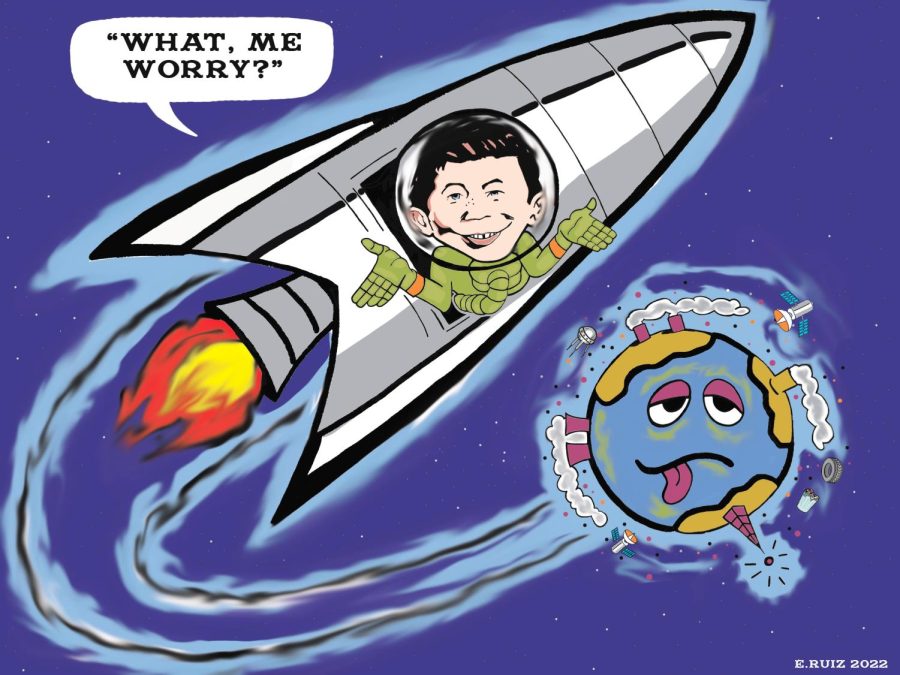Recycling, using biodegradable products save animal’s lives
April 14, 2022
As the consumer population continues to increase, animals are encountering more trash in their natural habitats. For humans, the impact may not seem serious, but animals are often harmed or killed by the scattered debris.
Marcus Eriksen, founder of 5 Gyers Institute, said at least 5.25 trillion individual pieces of plastic are floating in the world’s oceans in a report published in 2014. According to Eriksen’s studies, animals mistake the trash for food and suffer stomach issues and starvation.
And microplastic has now been detected in human blood, according to a paper published in Environment International.
Single-use plastics could be easily replaced with biodegradable products. “Every day people are throwing away tons of single-use cups, containers and other plastic ‘stuff,’” according to the Environment America website.
Often these single-use products are made from polystyrene foam, the kind used in foam cups and take-out containers. Polystyrene foam can break apart easily, its component particles can remain in the environment, threatening wildlife for hundreds of years to come.
With insight to facts such as these, why hasn’t something been done about finding a larger scale alternative for these products? Alternatives for other issues are created every day, so why hasn’t this large issue been addressed?
Don’t get me wrong, I love a nice cold drink from a fast food restaurant, but I think the restaurant industry could do a better job at finding single-use alternatives that won’t harm animals.
If there were a better alternative for foam cups made of polystyrene with more biodegradable material, we would see a slower spread of foam particles within the environment. “Biodegradable plastics take three to six months to decompose fully,” Jack Serle, Science Focus writer, said. “That’s much quicker than synthetic counterparts that take several hundred years.”
RECYCLING IS IMPORTANT
Another thing Americans seem overlook is the importance of recycling. Most likely, we have all done some recycling here and there. However, recycling every so often doesn’t get the job done.
Beloved creatures running free come across soda cans and water bottles all the time. If animals are hungry enough, they will try to eat them.
Recycling and using biodegradable products saves the precious lives of animals all across the world. Saving the lives of animals also leads to a thriving Earth.
When I was in sixth grade, I lived on the island of St. John in the U. S. Virgin Islands for nine months. My time on the island was magical and opened my eyes to the beauty of nature. The people care deeply about their island, its vegetation and the animals that roam free on the land and in the sea.
On St. John, as well as surrounding islands in the USVI, residents make it a point to recycle and dispose of trash properly to preserve the beauty of the land and protect the animals.
DANGER OF STRAWS
Straws are a common sight at bars and restaurants near beaches. However, if the wind picks up a loose straw, it will most likely end up near or in the ocean. A turtle or other sea life will mistake a floating straw as food which ultimately causes them harm. In 2015, a viral video of scientists spending 10 minutes removing a plastic straw from the nostril of a sea turtle brought attention to how something simple such as a straw affects sea life.
This issue became a concern to residents of the USVI and a law was passed September 2019 banning plastic straws and drink stirrers. “The ban prohibits the importation, sale, purchase or distribution of disposable plastic drinking straws,” according to The St. Thomas Source.
Imagine if the U.S. had laws such as the one passed by the USVI? What if we had more awareness centered on recycling in order to keep harmful items away from curious and hungry animals?
With more education and effort toward proper recycling and increasing the use of biodegradable products, the U.S. could be part of a drastic change that would positively impact the lives of wild animals.
There are 22 U.S. states putting the lives of wildlife over consumerism by creating bills, passing them and enforcing them to reduce single-use plastics. If the other 28 states would start the process of banning single-use plastics, our nation would begin to create a better environment for all living things.
I challenge every reader to make an effort to recycle each day and to replace as many single-use objects as they can with either reusable or biodegradable alternatives. If we all pitch in a little at a time, it can make a big difference. Especially for our favorite creatures that can’t speak up for themselves.



